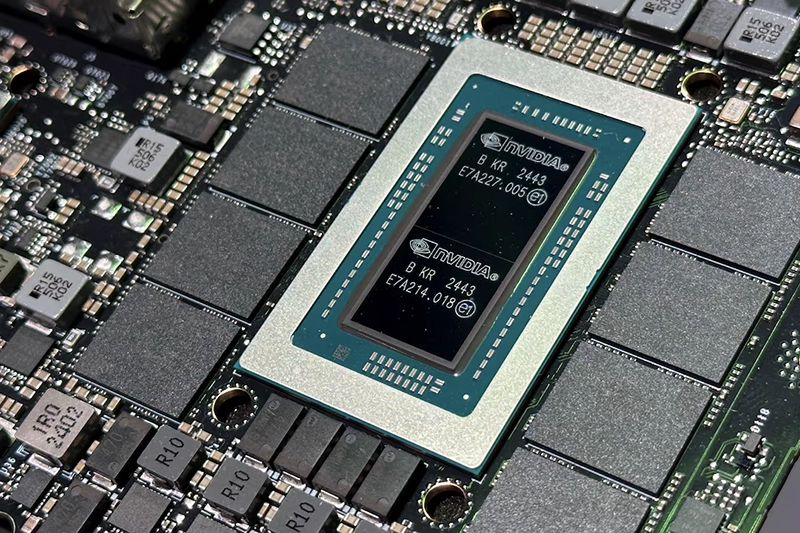By Stephen Nellis and Max A. Cherney
May 5, 2025 – 7:20 AM PDT

SAN FRANCISCO (Reuters) – A U.S. lawmaker plans to introduce legislation in coming weeks to verify the location of artificial-intelligence chips like those made by Nvidia after they are sold.
The effort to keep tabs on the chips, which drew bipartisan support from U.S. lawmakers, aims to address reports of widespread smuggling of Nvidia’s chips into China in violation of U.S. export control laws.
Nvidia’s chips are a critical ingredient for creating AI systems such as chatbots, image generators and more specialized ones that can help craft biological weapons. Both President Donald Trump and his predecessor, Joe Biden, have implemented progressively tighter export controls of Nvidia’s chips to China.
But Reuters and other news organizations have documented how some of those chips have continued to flow , and Nvidia has publicly claimed it cannot track its products after they are sold.
U.S. Representative Bill Foster, a Democrat from Illinois who once worked as a particle physicist, said the technology to track chips after they are sold is readily available, with much of it already built in to Nvidia’s chips. Independent technical experts interviewed by Reuters agreed.
Foster, who successfully designed multiple computer chips during his scientific career, plans to introduce in coming weeks a bill that would direct U.S. regulators to come up with rules in two key areas: Tracking chips to ensure they are where they are authorized to be under export control licenses, and preventing those chips from booting up if they are not properly licensed under export controls.
Foster told Reuters that there are already credible reports – some of which have not been publicly disclosed – of chip smuggling occurring on a large scale.
“This is not an imaginary future problem,” Foster told Reuters. “It is a problem now, and at some point we’re going to discover that the Chinese Communist Party, or their military, is busy designing weapons using large arrays of chips, or even just working on (artificial general intelligence), which is as immediate as nuclear technology.”
Nvidia declined to comment for this story.
Chip smuggling has taken on new urgency after the emergency of China’s DeepSeek, whose AI systems posed a strong challenge to U.S. systems and were built with Nvidia chips that were prohibited for sale to China, according analyst firm SemiAnalysis. Prosecutors in Singapore have charged three Chinese nationals with fraud in a case that involved servers that may have contained Nvidia chips.
Though it has not been put into broad use, the technology to verify the location of chips already exists. Alphabet’s (GOOGL.O), opens new tab Google already tracks the location of its in-house AI chips and others in its vast network of data centers for security purposes, according to two sources with direct knowledge of its operations.
Google did not respond to a request for comment.
Foster’s legislation would give the U.S. Department of Commerce six months to come up with regulations to require the technology.
BIPARTISAN SUPPORT
Foster’s bill has support from fellow Democrats such as Representative Raja Krishnamoorthi, the ranking member on the House Select Committee on China. “On-chip location verification is one creative solution we should explore to stop this smuggling,” Krishnamoorthi said in a statement.
Republicans are also supportive, with Representative John Moolenaar, who chairs the committee, telling Reuters that “the Select Committee has strong bipartisan support for requiring companies like Nvidia to build location-tracking into their high-powered AI chips — and the technology to do it already exists.
The technology for verifying the location of chips would rely on the chips communicating with a secured computer server that would use the length of time it takes for the signal to reach the server to verify where chips are, a concept that relies on knowing that computer signals move at the speed of light.
Tim Fist, a former engineer and director of emerging technology policy at Washington think tank Institute for Progress, said such tracking would provide a general, country-level location for chips. But that is far more information than the Bureau of Industry and Security, the arm of the U.S. Commerce Department responsible for enforcement of export controls, currently has.
“BIS has no idea which chips they should be targeting as a potential high priority to investigate once they’ve gone overseas,” Fist said. With location verification, “they now at least have bucketed the set of chips that are out there in the world into ones that are very likely to not have been smuggled and ones that warrant further investigation.”
Foster’s second legislative goal of preventing AI chips from booting up if they are not properly licensed under U.S. export controls would be more technologically complex to implement than location verification, but he said the time has come to begin discussions for both efforts.
“We’ve gotten enough input that I think now we can have more detailed discussions with the actual chip and module providers to say, ‘How would you actually implement this?'” Foster told Reuters.
Reporting by Stephen Nellis and Max A. Cherney in San Francisco; Editing by Kenneth Li and Matthew Lewis
What do YOU think? Click here to jump to the comments!
Sponsored Content Below

